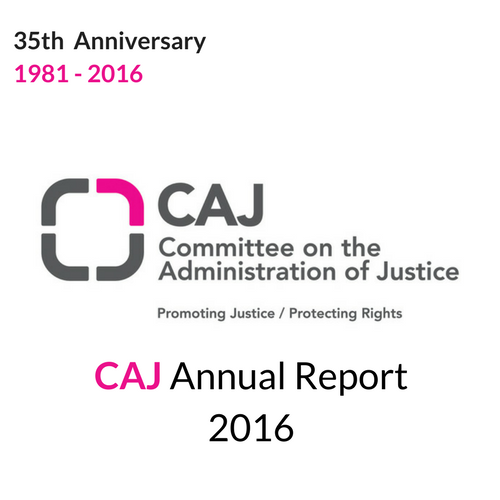CAJ Annual Report 2016
The year 2016 marks the 35th anniversary of CAJ’s formation. In the dark days of 1981, a standing committee was formed to keep alight the principles of human rights in the midst of a storm of violence and repression. The dogged determination to focus on human rights standards and hold the state to account stood us in good stead when it came to the peace process. CAJ and many others were successful in ensuring that equality and other human rights were at the centre of the settlement. Our task since then has been to try and make a reality of the construction of a new society based on human rights and the rule of law.
Unfortunately, 2016 has seen the cause of human rights suffer some heavy blows. The Brexit vote, irrespective of the motives of some of those who voted Leave, has been a victory in practice for racism and xenophobia. The election of Donald Trump as President of the United States has been a triumph for “postfact” populism and the most outrageous prejudices; if his inhuman and divisive ideology becomes embedded in the institutions of state we may have to confront the threat of fascism in the most powerful country in the world. This year too, the Mediterranean has become a killing ground for refugees from war and repression and horrors are being perpetrated on civilians in Syria and in many other countries throughout the world.
In these circumstances, when we can see human rights being abused and violated throughout the world, it would be easy In these circumstances, when we can see human rights being abused and violated throughout the world, it would be easy to dismiss the whole rights project as at best an irrelevance or at worst a distraction from “real” politics. In fact we would argue that promoting human rights is essential, not as a matter of faith, but as a practical course of effective action.
Human rights standards are a guide both to the kind of society we need and also to the elements that are necessary to achieve it. Human rights are not a replacement for politics and programmatic action across a multiplicity of areas, but they are an indispensable benchmark. No political programme that contravenes or ignores human rights standards will, in the end, achieve the willing and informed allegiance of humanity.
The actual treaties, laws, statements and codifications produced over the years at an international level represent not necessarily the highest imaginable aspirations for humanity but the highest aspirations that are practically and concretely achievable at this stage of history. As such, they are the most appropriate goal and normative framework for an imperfect world.
The most fundamental characteristic of human rights is their universality – they accrue to all people in all circumstances by simple virtue of their humanity. That outstanding feature gives them their practical strength as well as their moral power.
Human rights are the enemy of racism, xenophobia and all forms of prejudice and discrimination. They are not relativist or contingent but apply to all cultures and all circumstances. They are not comparative – the fact that worse violations occur elsewhere does not excuse any level of violation. In that sense human rights standards oppose and reprove the widespread and cynical exercise of “whataboutery,” and approve the simple morality of “two wrongs don’t make a right.” Human rights also apply to “us” as well as “you.” Whatever about charity, human rights begin at home; we dare not criticise the violations of others, however egregious, without condemning the violations that take place on our own patch.
There is therefore no better response to the reverses of this year than a renewed commitment to human rights activism.
Furthermore, if we do renew that commitment in a mood of optimism, our realistic appreciation of the massive violations that are taking place should also help us guard against complacency. Nobody wants to be a doomsayer, but it would be the gravest mistake to underestimate the danger that an emboldened, racist populism may represent to our civilisation. In the Thirties, some people felt that Nazism was an aberration which would pass – it would be safer for the time being to conform rather than resist. Hindsight shows us that was a mistake – let us not make it again.
The rest of this report gives an account of how we have been trying to meet our responsibilities as a human rights organisation over the past year.
The work will continue.
